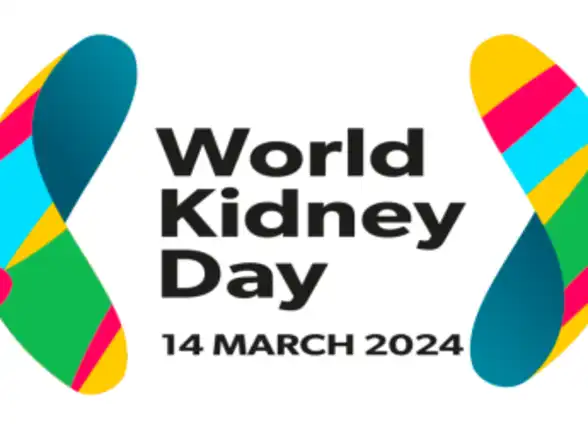MARCH WORLD KIDNEY DAY ONLY: Kidney Health for All
The theme for World Kidney Day 2024 is Advancing Equitable Access to Care and Optimal Medication Practice, focusing on recent medical advances in CKD.
Get insurance benefits, legal documents, and medical records in one place

The National Kidney Foundation (NKF) offers a 1-minute Kidney Quiz to determine risk for kidney disease.
Celebrate World Kidney Day and learn about kidney health
World Kidney Day (WKD) is a joint initiative of the International Society of Nephrology (ISN) and the International Federation of Kidney Foundations (IFKF). These organizations recognized that kidney disease, with its devastating consequences if left untreated, is a condition that would benefit from worldwide public exposure. The first WKD was in March 2006.
Each year World Kidney Day (WKD) takes place on the second Thursday of March. WKD is a global health alertness campaign focusing on the importance of the kidneys and reducing the frequency and impact of renal disease and its associated health problems. This is a global campaign celebrated in many countries, not just the U.S.
In the U.S., however, landmarks and buildings nationwide are lit orange, the signature color of kidney disease, in honor of WKD.
WKD 2024: Advancing equitable access to care and optimal medication practice
Chronic kidney disease (CKD) affects over 850 million people globally, causing 3.1 million deaths in 2019 and ranking as the 8th leading cause of death. Projections indicate it could become the 5th leading cause of years of life lost by 2040 if unaddressed. While efforts have historically focused on kidney replacement therapies, recent breakthroughs provide opportunities to prevent or delay CKD, improving life quality and longevity. However, universal accessibility to these therapies faces challenges, including lack of awareness, insufficient knowledge, shortages of specialists, and treatment costs, creating disparities, especially in low- and middle-income countries. Addressing these barriers requires a shift towards CKD awareness and healthcare workforce capacity building, considering regional contextual differences and gaps in early diagnosis, healthcare coverage, awareness, and medication accessibility.
A multi-pronged strategy is required to save kidneys, hearts, and lives, which includes:
Health policies that holistically integrate kidney care into existing health programs, secure funding for kidney care, and disseminate kidney health knowledge to the public and the healthcare workforce, as well as grant equitable access to kidney disease screening, tools for early diagnosis, and sustainable access to quality treatment.
Healthcare delivery. It is essential to adopt a comprehensive, patient-centered, and locally oriented approach to identify and remedy barriers to high-quality kidney care.
Healthcare professionals. Addressing the shortage of primary care professionals and kidney specialists requires enhancing training, minimizing loss of healthcare providers, and building capacity among healthcare workers, including primary care physicians, nurses, and community health workers.
Empowering patients and communities to overcome struggles to access care and medication due to high costs and misinformation, which impact their health behaviors and adherence, by involving them in advocacy organizations and local communities that can help them make informed decisions and improve their health outcomes.
About kidney disease
An estimated 37 million (1 in 7) U.S. adults have chronic kidney disease and approximately 90% don’t know they have it. 1 in 3 U.S. adults are at risk for chronic kidney disease. Risk factors for kidney disease include diabetes, high blood pressure, heart disease, obesity, kidney stones, prolonged use of over-the-counter pain medications (especially ibuprofen and naproxen), age 60 or older, and family history.
People of Black or African American, Hispanic or Latino, American Indian or Alaska Native, Asian American, or Native Hawaiian or Other Pacific Islander descent are at increased risk for developing the disease. Blacks or African Americans are almost four times more likely than White Americans to have kidney failure, and Hispanics are 1.3 times more likely than non-Hispanics to have kidney failure.
Other kidney disease facts:
Kidney disease kills more people each year than breast or prostate cancer.
It is recommended that anyone over age 60 get kidney disease screening annually.
Of the over 120,000 Americans on the national organ transplant waitlist, more than 98,000 await a life-saving kidney.
National Kidney Foundation (NKF)
The National Kidney Foundation (NKF) offers a 1-minute Kidney Quiz to determine risk for kidney disease.
The National Kidney Foundation (NKF) is the largest, most comprehensive, and longstanding patient-centric organization dedicated to the awareness, prevention, and treatment of kidney disease in the U.S.
RESOURCES
National Kidney Foundation (NKF)
WorldKidneyDay.org - 2024 Campaign
No content in this app, regardless of date, should ever be used as a substitute for direct medical advice from your doctor or other qualified clinician.
Get more support and guidance on insurance benefits, medical records and legal forms.
Helpful brings together your insurance benefits, legal documents, and medical records in one personalized place — so you always know what you have, and never have to search again.

Technology for Health Tasks. Mental Health for the Tough Stuff.
Helpful connects your medical records, insurance, and caregiving tasks automatically. And when you need more than logistics, a therapist is here to guide you.
In-Network and Covered
For Individuals, Couples and Families
HIPAA Compliant, Data Stays Private






